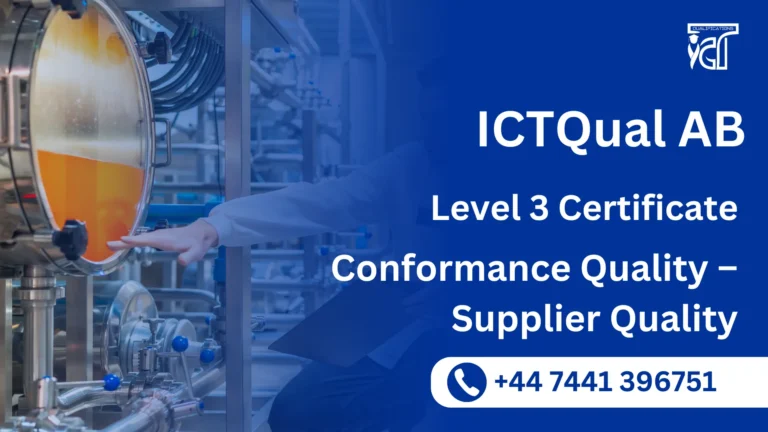The ICTQual AB Level 6 Diploma in Instrumental Quality Assurance and Quality Control (QA/QC) is a comprehensive qualification designed for learners seeking advanced expertise in industrial quality systems. This program emphasizes the integration of instrumental techniques with modern QA/QC methodologies, equipping participants to ensure precision, compliance, and reliability across diverse technical environments. It is tailored for both emerging professionals and experienced practitioners aiming to progress into senior roles in quality management.
Learners are introduced to advanced inspection processes, compliance frameworks, and international standards, alongside specialized modules in instrumentation, calibration, and testing. The course blends theoretical knowledge with practical application, enabling participants to confidently manage quality systems in industries such as manufacturing, oil & gas, pharmaceuticals, and engineering. By focusing on both technical and procedural aspects, the diploma ensures learners develop a holistic understanding of QA/QC practices.
The program also builds strategic and managerial competencies, preparing learners to lead QA/QC teams, design quality frameworks, and oversee multi‑stage audits. Emphasis is placed on documentation, risk management, and corrective action planning, ensuring graduates can handle complex operational challenges in high‑reliability environments. This balance of technical mastery and leadership skills makes the qualification highly relevant for organizations striving for continuous improvement and global compliance.
Upon completion, learners will be well‑positioned for roles such as QA/QC Engineer, Quality Manager, or Compliance Specialist. The diploma also provides a pathway to further professional certifications and advanced study, offering global recognition and career advancement opportunities. With its strong focus on instrumental QA/QC, this qualification empowers professionals to contribute meaningfully to organizational success and industry excellence.
ICTQual AB Level 6 Diploma in Instrumental Quality Assurance and Quality Control QA/QC
This qualification, the ICTQual AB Level 6 Diploma in Instrumental Quality Assurance and Quality Control QA/QC, consists of 6 mandatory units.
| Sr# | Unit Title |
| 1 | Strategic QA/QC Planning and ITP Integration in Large Projects |
| 2 | Supervisory Use of Checklists and Multi‑Level Inspections |
| 3 | Material Receiving, Preservation, and Non‑Conformance Management |
| 4 | NEC/NEMA Standards for Complex Installations (Cable Trays, Grounding, Conduits) |
| 5 | Instrument Elements (Pressure, Flow, Temperature, Level) – Calibration and Compliance with Aramco Standards |
| 6 | Professional Practice in Loop Checking, Testing, and Commissioning for Industrial Systems |
Learning Outcomes for the ICTQual AB Level 6 Diploma in Instrumental Quality Assurance and Quality Control QA/QC:
1. Strategic QA/QC Planning and ITP Integration in Large Projects
- Develop strategic QA/QC plans aligned with project scope, timelines, and risk profiles
- Integrate Inspection Test Plans (ITPs) across engineering, procurement, and construction phases
- Coordinate QA/QC activities across multiple contractors and disciplines
- Evaluate ITP effectiveness using performance metrics and audit feedback
- Align QA/QC planning with international standards and client specifications
- Manage documentation workflows for multi-stage inspections
- Lead quality planning meetings and communicate ITP requirements to stakeholders
- Ensure traceability and accountability throughout the inspection lifecycle
2. Supervisory Use of Checklists and Multi-Level Inspections
- Design multi-tiered QA/QC checklists for supervisory audits and field inspections
- Implement checklist protocols across teams and subcontractors
- Monitor inspection performance using structured checklist data
- Identify trends and recurring issues through checklist analysis
- Train inspection teams in checklist-based compliance procedures
- Document inspection outcomes for regulatory and client reporting
- Conduct supervisory audits and escalate non-conformances appropriately
- Integrate checklist systems into digital QA/QC platforms
3. Material Receiving, Preservation, and Non-Conformance Management
- Oversee material receiving procedures and verify documentation accuracy
- Implement advanced preservation techniques for instrumentation components
- Monitor environmental and handling conditions affecting material integrity
- Manage traceability systems for materials across the supply chain
- Identify, document, and resolve material non-conformances
- Coordinate with vendors and suppliers to ensure compliance with specifications
- Maintain preservation logs and inspection records for audits
- Lead root cause analysis and corrective action planning for material issues
4. NEC/NEMA Standards for Complex Installations (Cable Trays, Grounding, Conduits)
- Interpret NEC and NEMA standards for high-complexity instrumentation installations
- Inspect cable tray systems, grounding networks, and conduit layouts for compliance
- Identify installation faults and recommend corrective actions
- Coordinate inspections across electrical, instrumentation, and civil teams
- Document findings in accordance with QA/QC and safety protocols
- Ensure installations meet operational, safety, and regulatory requirements
- Communicate standard requirements to contractors and project managers
- Lead compliance audits and contribute to final certification processes
5. Instrument Elements (Pressure, Flow, Temperature, Level) – Calibration and Compliance with Aramco Standards
- Calibrate instrumentation elements using industry-standard procedures
- Verify compliance with Aramco and international calibration standards
- Document calibration results and maintain traceability records
- Identify calibration drift and implement corrective actions
- Coordinate calibration schedules across project phases
- Train technicians in calibration and compliance protocols
- Conduct audits of calibration practices and equipment
- Ensure instrumentation accuracy for commissioning and operational readiness
6. Professional Practice in Loop Checking, Testing, and Commissioning for Industrial Systems
- Plan and execute loop checks for complex instrumentation systems
- Conduct functional testing of pressure, flow, temperature, and level instruments
- Document loop check and commissioning results in line with QA/QC standards
- Troubleshoot issues during testing and commissioning phases
- Coordinate commissioning activities with engineering and operations teams
- Ensure compliance with safety, performance, and regulatory standards
- Lead commissioning handover and certification processes
- Mentor junior staff in professional testing and commissioning practices
The ICTQual AB Level 6 Diploma in Instrumental Quality Assurance and Quality Control (QA/QC) is designed to equip learners with advanced technical and managerial skills required to uphold global quality standards. This program blends instrumental techniques with modern QA/QC practices, preparing professionals to take on leadership roles in industries where precision, compliance, and reliability are critical.
Technical Mastery
- Advanced instrumental techniques: Training in calibration, inspection, and testing methods.
- Application of international standards: NEC, NEMA, Aramco, API, and ISO frameworks.
- Integration of theory and practice: Hands‑on learning for real industrial environments.
- Specialized QA/QC knowledge: Focus on civil, mechanical, petrochemical, and fabrication practices.
Leadership & Management Skills
- Team leadership development: Ability to manage QA/QC teams effectively.
- Audit and compliance oversight: Skills to conduct and supervise multi‑stage audits.
- Strategic quality planning: Designing frameworks for continuous improvement.
- Risk management expertise: Identifying, assessing, and mitigating operational risks.
Career Advancement
- Global recognition: Qualification respected across industries worldwide.
- Expanded career pathways: Roles such as QA/QC Engineer, Quality Manager, or Compliance Specialist.
- Progression opportunities: Access to higher‑level certifications and advanced study.
- Industry versatility: Skills applicable in manufacturing, oil & gas, pharmaceuticals, and engineering.
Organizational Impact
- Enhanced compliance: Ensuring adherence to global quality standards.
- Improved efficiency: Streamlining processes through effective QA/QC systems.
- Continuous improvement culture: Driving innovation and reliability in operations.
ICTQual AB Level 6 Diploma in Instrumental Quality Assurance and Quality Control QA/QC is designed for individuals who want to excel in the field of quality assurance and quality control with a strong focus on instrumental techniques. It caters to both fresh graduates seeking to establish a career in QA/QC and experienced professionals aiming to strengthen their skills and progress into senior roles. The program ensures learners gain the technical, managerial, and compliance knowledge required to thrive in industries where precision and reliability are critical.
Learners with Technical Backgrounds
- Engineering graduates: Those with civil, mechanical, electrical, or chemical engineering foundations.
- Technicians and inspectors: Professionals already engaged in calibration, testing, or instrumentation.
- Manufacturing specialists: Individuals working in production or fabrication environments.
- Oil & gas professionals: Learners from petrochemical and energy sectors seeking QA/QC expertise.
- Pharmaceutical and healthcare staff: Those involved in regulated industries requiring strict compliance.
Career‑Focused Professionals
- Aspiring QA/QC engineers: Learners aiming to enter specialized quality roles.
- Mid‑career professionals: Those seeking promotion into supervisory or managerial positions.
- Compliance officers: Individuals responsible for ensuring adherence to international standards.
- Project coordinators: Professionals managing multi‑stage industrial projects.
- Audit specialists: Learners interested in advancing their skills in inspection and certification.
Global Learners & Career Changers
- International candidates: Learners seeking globally recognized qualifications for career mobility.
- Career changers: Professionals transitioning into QA/QC from other technical fields.
- Continuous learners: Individuals committed to lifelong learning and professional development.
- Industry consultants: Those advising organizations on quality frameworks and compliance.
- Future leaders: Learners aspiring to senior management roles in quality assurance.
Organizational & Industry‑Driven Learners
- Corporate employees: Staff sponsored by organizations to strengthen QA/QC capacity.
- Industrial trainers: Professionals preparing to mentor or train QA/QC teams.
- Risk management specialists: Learners focusing on safety, reliability, and corrective action planning.
- Process improvement experts: Individuals driving efficiency and innovation in operations.
Future progression from the ICTQual AB Level 6 Diploma in Instrumental QA/QC is designed to ensure learners continue building both academic and professional pathways. This qualification acts as a bridge between technical mastery and strategic leadership, opening opportunities for higher‑level study, industry recognition, and career advancement. Graduates are well‑positioned to pursue postgraduate qualifications, professional memberships, and senior roles across multiple sectors.
Academic Progression
- Level 7 Diplomas: Eligibility to enroll in advanced QA/QC or engineering management diplomas.
- MBA programs: Pathway to business and management studies with a technical specialization.
- Master’s degrees: Opportunities in engineering, industrial management, or quality systems.
- Postgraduate research: Potential to contribute to academic studies in QA/QC innovations.
- International study options: Recognition across global institutions for higher education.
Professional Certifications
- Specialized QA/QC certifications: Advanced training in welding, piping, or instrumentation QA/QC.
- ISO auditor qualifications: Certification to conduct audits aligned with ISO standards.
- Industry‑specific credentials: Compliance certifications for oil & gas, pharmaceuticals, or manufacturing.
- Risk management certifications: Training in safety, reliability, and corrective action planning.
- Professional memberships: Access to global engineering and quality assurance bodies.
Career Advancement
- QA/QC Engineer: Progression into specialized technical inspection roles.
- Quality Manager: Leadership positions overseeing organizational quality systems.
- Compliance Specialist: Roles ensuring adherence to international standards.
- Project Quality Lead: Managing QA/QC across multi‑stage industrial projects.
- Consultant roles: Advising organizations on quality frameworks and compliance strategies.
Industry Opportunities
- Manufacturing sector: Senior QA/QC roles in production and fabrication.
- Oil & gas industry: Advanced inspection and compliance positions.
- Pharmaceuticals: Quality leadership in regulated healthcare environments.
- Civil and mechanical engineering: Supervisory roles in construction and infrastructure projects.
- Global mobility: Opportunities to work internationally with recognized qualifications.
Entry Requirements
Learners must meet the following criteria to be considered for admission into the course:
- Age Requirement: Learners must be 21 years or older at the time of enrollment.
- Educational Background:A Level 6 Diploma or equivalent qualification in QA/QC, engineering, or a related technical discipline is required.
- Work Experience: Learners should ideally have at least 2–3 years of relevant industry experience in QA/QC, compliance, inspection, or engineering project management. This ensures they can engage with the advanced and instrumental aspects of the program.
- English Language Proficiency: Since the course is delivered in English, learners must demonstrate intermediate to advanced proficiency in written and spoken English (e.g., IELTS 5.5–6.0 or equivalent for non‑native speakers).
Register Now
Qualification Process
Qualification Process for the ICTQual AB Level 6 Diploma in Instrumental Quality Assurance and Quality Control QA/QC
- Self-Assessment:
Begin by evaluating your eligibility to ensure you meet the qualification requirements, including work experience, knowledge, and language proficiency. - Registration:
Complete your registration by submitting the required documents, including a scanned copy of a valid ID, and paying the registration fee. - Induction:
An assessor will conduct an induction to confirm your eligibility for the course and explain the evidence requirements. If you do not meet the criteria, your registration will be cancelled, and the fee will be refunded. - Assignments & Evidence Submission:
Provide all assignments and the necessary evidence based on the assessment criteria outlined in the course. If you are unsure of the required evidence, consult with the assessor for guidance on the type and nature of evidence needed. - Feedback and Revision:
The assessor will review your submitted evidence and provide feedback. Evidence that meets the criteria will be marked as “Criteria Met,” while any gaps will be identified. You will be asked to revise and resubmit if needed. - Competence Evidence:
Submit final evidence demonstrating that all learning outcomes have been met. This evidence will be marked as “Criteria Met” by the assessor once it is satisfactory. - Internal Quality Assurance (IQA):
The Internal Quality Assurance Verifier (IQA) will review your evidence to ensure consistency, quality, and compliance with standards. - External Verification:
The IQA will submit your portfolio to ICTQUAL AB External Quality Assurance Verifiers (EQA) for final confirmation. The EQA may contact you directly to verify the authenticity of your evidence. - Certification:
Upon successful completion of all checks, ICTQUAL AB will issue your official certificate, confirming that you have attained the ICTQual AB Level 6 Diploma in Instrumental Quality Assurance and Quality Control QA/QC







